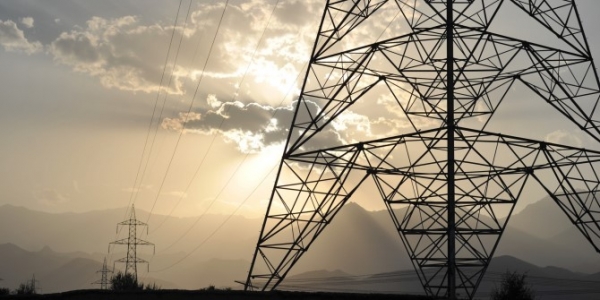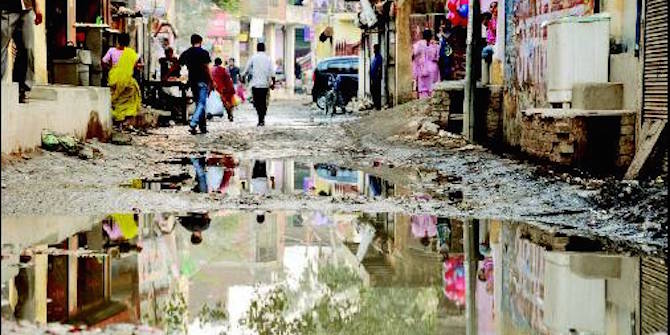
 Following protests and violence in Afghanistan, Rabia Nasimi and Chloe Blades discuss the proposed TUTAP project, which promises to double electricity coverage. They consider why the Hazara minority in particular feel like they are being excluded from the benefits that the power line will bring, and why this is seen as part of a wider trend of neglect by the incumbent National Unity Government.
Following protests and violence in Afghanistan, Rabia Nasimi and Chloe Blades discuss the proposed TUTAP project, which promises to double electricity coverage. They consider why the Hazara minority in particular feel like they are being excluded from the benefits that the power line will bring, and why this is seen as part of a wider trend of neglect by the incumbent National Unity Government.
Backed by the Asia Development Bank (ADB), a multi-million-dollar power transmission line named TUTAP is set to link energy-rich states, Turkmenistan, Uzbekistan, and Tajikistan, with Afghanistan and Pakistan. On the surface, this project looks set to benefit Afghanistan, which had just 28% electricity coverage in 2012, as the plans promise that on completion almost 60% of the country will have access to power. However, planning a transmission line through a country that is fraught with conflict is not easy. Already the complex technical and economic planning has reignited old tensions. Many Hazara, an ethnic minority group making up 9% of the population, feel discriminated against since negotiations within Ghani’s party to reroute the transmission line through the majority Hazara province of Bamyan rather than the majority Tajik Salang Pass were unsuccessful.

It was in 2013 that the Second Vice President, Mohammad Sarwar Danish, suggested that the transmission line should be rerouted via Bamyan after an assessment produced by German engineering consultancy Fichtner for the ADB outlined that “the Bamyan route will avoid the narrow space and difficulties along the Salang Pass” (p.1-3). The Salang Pass connects Northern Afghanistan with Parwan province, which is seen as already having the potential to develop into a centre for various kinds of high value products needed in Afghanistan. In the eyes of many Hazara, it is Bamyan’s turn to be subject to such developmental projects that push for economic growth, which President Ghani promised for all of Afghanistan’s people during his presidential campaign.
Additionally, the Hazara see economic development in the bigger cities leaving the minority ethnic groups in the less developed provinces without basic necessities, including power. Bamyan, for example, has an electricity connection rate of less than 10%, and now they are told that “[m]ajor emphasis will be put on an increase of the connection rates in large cities. Kabul and Herat are therefore assumed to reach 90% connection rates within five years, while in Balkh and Kandahar 80% will be connected in the same period” (p.3-12). This suggests further for the Hazara that Ghani is ignoring the need for development in Bamyan by directing growth opportunities into provinces that have already seen a vast amount of time and monetary investment. The sense is that the President is not allowing the predominantly Hazara province to grow, which according to a spokesperson from the Danish Refugee Council (DRC) we spoke to, “provides a bigger space for Hazaras to interpret that the only reason behind rerouting is discrimination.”
Furthermore, Afghanistan is one of the poorest and least developed countries in the world. The Fichtner report emphasises that “36% of the Afghan population live below the poverty line (up to 80% in the countryside) and about 75% are illiterate” (p.3-6). The country is therefore heavily reliant on foreign aid for its development, infrastructure, and human welfare and it received “over US$56 billion of development assistance between 2002 and 2010” (3-8) during the US Coalition. However many Hazara accuse the Government of not distributing this fairly to the provinces where they form a majority.
President Ghani, on the other hand, has defended his decision to continue with the initial plan of building the 500kV transmission line via Salang Pass. He stated during his public address on 12 May 2016 at the Royal United Services Institute (RUSI) that in 2013 before his election that,
“a decision was made to pass the transmission line through the Salang Pass rather than the Bamyan Valley. It was the wrong decision at the time but meanwhile three years of work have gone to prepare the Salang Pass and six million people will benefit from this transmission line compared to one hundred thousand from the alternative”.
He also makes it clear, that he did not approve for the project to go ahead immediately after it was agreed,
“because it did not answer provision of electricity to Bamyan […]. I approved the project […] on the firm guarantee, including $55million of financing, that Bamyan will have electricity.”
Bamyan, he declared, will not just receive the 30Mw that they require, but 300Mw to ensure provisions of power.
Ghani went on to emphasise that as the works to facilitate the transmission line were already underway during the negotiations, stopping now would cause “3 years of interruption and a $60 million loss of committed funds and darkness for 6 million people”. Many Hazara believe that this argument is weak, and, as our spokesperson at the DRC stated, “negotiation failed merely because the Hazara senior leaders are treated as nothing more than tokens in Ghani’s government”. Ghani defended his decision stressing that all ethnic groups are represented within his government by pointing out that, “if you want facts and figures the Minister for Public Works is Hazara and there is an 80-page report commissioned to give you every single project that is today work in Central Afghanistan,” underlining his commitment to the promises made during his presidential campaign.
It was after it became clear that the negotiations had been unsuccessful that conflict then arose. Many Hazara took to the streets of Kabul to protest peacefully, but this led to fatal attacks against them. Da’esh accepted responsibility for two suicide bombers who detonated amongst the protesters, explaining that Shi’a Hazara are heretics and will not be recognised as Muslim. The Hazara have been and are still being targeted due to their religious beliefs and distinct features, according to a UK representative from the World Hazara Council:
“The tragic incident [in Kabul] on the 11th October 2016 and the double explosions on the peaceful demonstrations a few months ago are both prime examples of this. The Hazaras understand that there is discrimination in the country. We face it the most, but it happens in every corner of the country. So we want to become the voice for inequality, discrimination, and unbalanced development in Afghanistan”.
There have been many attacks on Hazara individuals and groups documented recently, including attacks that were specifically aimed at Hazara as Shia Muslims, such as those in Kabul and Balkh during the Shia Ashura festival earlier this month, leading to concerns that discrimination against this group is increasing. However, activists from some other ethnic groups have challenged the alleged discrimination against Hazara, reflecting the tensions that this debate has engendered. One civil activist from Afghanistan told us that “the Hazara ethnicity has faced discrimination in the past, but times have changed, the situation is now better”. The activist also defends Ghani and the accusations against him, explaining that,
“Ghani is ethnically Pashtun, and if the transmission line goes through Bamyan it is a Hazara majority province and if it goes through Salang it is a Tajik Majority province. How is Ghani being ethnic, when neither route relates to his ethnicity?”
For a country that is as ethnically diverse as Afghanistan it is essential for the stability of the country and its further development that citizens can trust that the decisions taken by government are fair, non-discriminatory and lead to improvements for all citizens, whatever their ethnicity. Despite the government pointing to diversity among decision makers, there remain many, particularly from the Hazara community, who remain unconvinced.
This article focusses on the debate surrounding the pipeline route and as such is not meant to be read as a statement on Hazara persecution more generally. For more information on this issue see for example the World Hazard Council and UNHCR.
This article gives the views of the authors, and not the position of the South Asia @ LSE blog, nor of the London School of Economics. Please read our comments policy before posting.
About the Authors
 Rabia Nasimi is an MSc Candidate in Sociology (Research) at LSE. Her research interests include identity, ethnicity and nationalism, particularly in relation to Afghanistan. You can follow her on Twitter at @rabianasimi.
Rabia Nasimi is an MSc Candidate in Sociology (Research) at LSE. Her research interests include identity, ethnicity and nationalism, particularly in relation to Afghanistan. You can follow her on Twitter at @rabianasimi.
 Chloe Blades is an English Literature graduate from Loughborough University currently living and working in Auckland, New Zealand. She is a social activist and fundraiser for the betterment of the situation for the people of Afghanistan. You can follow her on Twitter @KloRach.
Chloe Blades is an English Literature graduate from Loughborough University currently living and working in Auckland, New Zealand. She is a social activist and fundraiser for the betterment of the situation for the people of Afghanistan. You can follow her on Twitter @KloRach.






